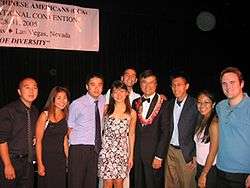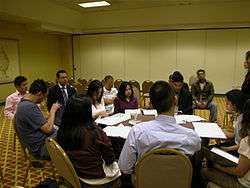National APIA Panhellenic Association
| National APIA Panhellenic Association | |
|---|---|
 | |
| Data | |
| Established | 2006 |
| Members | 14 |
| Continent | North America |
| Country | United States |
| Organization type | Coalition of Members |
The National APIA Panhellenic Association (or NAPA, formerly known as the National Asian Greek Council) is an association of collegiate fraternities and sororities that was formally organized in 2006, although it began in 2005.
The founding organizations officially chartered the National APIA Panhellenic Association on August 12, 2006. The purpose of the association is to create an umbrella organization that can unite Asian Fraternities and Sororities onto common causes and facilitate communication between the various organizations.
History

The National Asian Pacific Islander American Panhellenic Association (NAPA) began in the summer of 2004 when a group of 14 APIA fraternities and sororities joined together to form the APIA Greek Alliance (AGA). Formed as a partnership in a grassroots “Get Out the Vote” campaign with APIA Vote, an organization that promotes civic participation among Asian and Pacific Islander Americans, the members of the AGA registered over 8,000 new voters. Seeing the successful collaboration’s potential impact on the APIA community and on college/university campuses, the group collaborated on further projects, including Tsunami Relief and Hurricane Katrina Relief.
In the summer of 2005, with support from OCA, a national organization dedicated to advancing the social, political, and economic well-being of Asian Pacific Americans, the AGA hosted the first-ever leadership summit between the various national APIA fraternities and sororities. The summit provided the first in-person opportunity for these organizations’ leaders to engage in serious dialogue about the challenges and future of the APIA fraternity/sorority community. By the end of the summit, recognizing the need for an umbrella organization for APIA fraternities and sororities, the fraternities and sororities in attendance chose to form the foundation for what would become the National Asian Pacific Islander American Panhellenic Association.[1]
Executive Board

- Chair - Hannah Seoh, Delta Phi Lambda
- Vice Chair - Vigor Lam, Pi Delta Psi
- Secretary - Teri Chung, Kappa Phi Lambda
- Director of Finance - Alison Kao, Delta Phi Lambda
- Director of Communications - Angela Ju Alpha Kappa Delta Phi
- Director of Technology - Bryan Dosono, Lambda Phi Epsilon
- Director of Interfraternal Relations - Prashant Kher, Beta Chi Theta
- Director of Operations - Michelle Wu, Sigma Psi Zeta
- Director of Programs, Workshops - Christiana Cabrera, Sigma Lambda Gamma
- Director of Programs, Initiatives - Jose Pangelinan, Sigma Lambda Beta
- Past Chair - Brenda Dang, Alpha Kappa Delta Phi
- NAPA Advisor - Mary Peterson
Note: Positions on the Executive Board not listed here includes the Board of Presidents and the Advisory Board.[2]
Members
The members of the National Asian Pacific Islander American Panhellenic Association are shown below in alphabetical order.
Citations
- ↑ "About NAPA". NAPA. Archived from the original on April 18, 2009. Retrieved 2010-01-23.
- ↑ "NAPA Executive Board". NAPA. Archived from the original on December 29, 2008. Retrieved 2010-01-24.